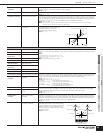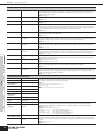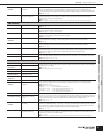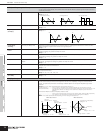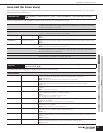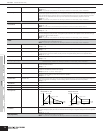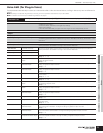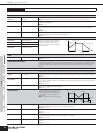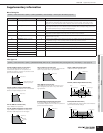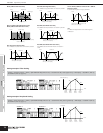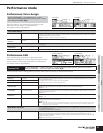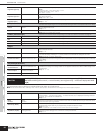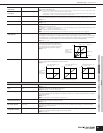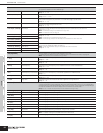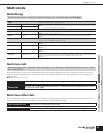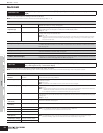
Owner’s Manual
Utility
Voice mode
Performance modeMulti modeEffectArpeggio
Reference
Voice mode Supplementary information
77
Supplementary information
Micro Tuning List
Filter Type List
LPF24D (24dB/oct Digital Low Pass Filter)
A dynamic 24dB/oct low-pass filter with a
characteristic digital sound. Compared to the
LPF24A type (below), this filter can produce a more
pronounced resonance effect.
LPF24A (24dB/oct Analog Low Pass Filter)
A digital dynamic low-pass filter with characteristics
similar to a 4-pole analog synth filter.
LPF18 (18dB/oct Low Pass Filter)
3-pole 18dB/oct low-pass filter.
LPF18s (18dB/oct Staggered Low Pass Filter)
3-pole 18dB/oct low-pass filter. This filter has a
smoother cutoff slope than the LPF18 type.
LPF12 (12dB/oct Low Pass Filter)
12dB/oct low-pass filter. This filter is designed to be
used in conjunction with a high-pass filter.
LPF6 (6dB/oct low-pass Filter)
1-pole 6dB/oct low-pass filter. No resonance. This
filter is designed to be used in conjunction with a
high-pass filter.
HPF24D (24dB/oct Digital High Pass Filter)
A dynamic 24dB/oct high-pass filter with a
characteristic digital sound. This filter can produce a
pronounced resonance effect.
HPF12 (12dB/oct High Pass Filter)
12dB/oct dynamic high-pass filter.
BPF12D (12dB/oct Digital Band Pass Filter)
BPFw (Wide Band Pass Filter)
A 12dB/oct BPF that combines HPF and LPF filters to
allow wider bandwidth settings.
[VOICE] → select Normal Voice → [EDIT] → [SHIFT]+[COMMON] → General display → “M.TuningNo.”/ “M.TunRoot” (page 65)
M.TuningNo. Type M.TuningRoot Comments
00 Equal Temp (Equal temperament) -- The “compromise” tuning used for most of the last 200 years of Western music, and found on
most electronic keyboards. Each half step is exactly 1/12 of an octave, and music can be
played in any key with identical results. However, none of the intervals are perfectly in tune.
01 PureMaj (Pure major) C ~ B This tuning is designed so that most of the intervals (especially the major third and perfect fifth)
in the major scale are pure. This means that other intervals will be correspondingly out of tune.
You need to specify the key (C~B) you will be playing in.
02 PureMin (Pure minor) C ~ B The same as Pure Major, but designed for the minor scale.
03 Werckmeist (Werckmeister) C ~ B Andreas Werckmeiser, a contemporary of Bach, designed this tuning so that keyboard
instruments could be played in any key. Each key has a unique character.
04 Kirnberger C ~ B Johann Philipp Kirnberger, an 18th century composer, created this tempered scale to allow
performances in any key.
05 Vallot&Yng (Vallotti & Young) C ~ B Francescatonio Vallotti and Thomas Young (both mid-1700s) devised this adjustment to the
Pythagorean tuning, in which the first six fifths are lower by the same amount.
06 1/4 Shift (1/4 shifted) -- This is the normal equal tempered scale shifted up 50 cents.
07 1/4 tone -- Twenty-four equally spaced notes per octave. (Play twenty-four notes to move one octave.)
08 1/8 tone -- Forty-eight equally spaced notes per octave. (Play forty-eight notes to move one octave.)
09 Indian -- Usually observed in Indian music (white keys only).
10 Arabic 1 C ~ B Usually observed in Arabic music.
11 Arabic 2
12 Arabic 3
[VOICE] → select Normal Voice → [EDIT] → [MUTE/SEL/ENTER] (LED turns off) → select Element with [1/5/9/13]-[4/8/12/16] → Filter display → “Type” (page 70)
Resonance
These frequencies are
“passed” by the filter.
Resonance
LPF18
LPF18s
Resonance
Resonance
Resonance
Resonance
12db/oct
Resonance
Cutoff range
Cutoff range
Range passed
Level
Frequency
Width can be
increased
Cutoff range
Cutoff range
Range passed
Level
Frequency



